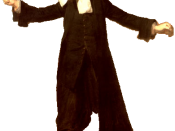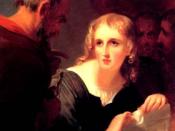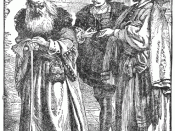The Many Faces of Shylock
Throughout history, people of the Jewish faith have been persecuted for reasons none other than their religion. This ever-present Anti-Semitism was obvious in the Elizabethan period, when William Shakespeare wrote his plays. One of his works, which focuses greatly on the negative bias against Jews, is The Merchant of Venice, which opened sometime in 1596. In the story, Bassanio, a young man infatuated with a wealthy heiress named Portia, borrows money from his friend Antonio. Antonio, in turn, borrows money from a Jewish banker, Shylock. When Antonio forfeits the loan, Shylock is eager to take the pound of Antonio's flesh that was agreed as punishment. Portia, however, uses the law to prevent Shylock from doing so, and through trickery forces Shylock to give up his possessions and convert to Christianity. Throughout the story Antonio is blatantly condescending to Shylock, which has lead many critics over the centuries to give many different interpretations of Shylock's character.
Three of the most common interpretations include a Shylock that is totally evil, one that is fully pitiful, and a Shylock who can be both tragic and comedic at the same time.
One way many people interpret Shylock is as a man who is completely evil and vengeful. Critics prove this characterization by pointing out that, although Shylock loves his family, he loves them merely as possessions, like his money (Webster 123). For example, when Shylock's daughter, Jessica, elopes with a Christian and sells Shylock's ring, many critics would argue that Shylock was more upset about losing the ring than he was about losing his daughter, because he runs about, screaming "O my ducats! O my daughter!" (II.viii.15). In addition, he was extremely quick to name the violent terms of the deal with Antonio for...


